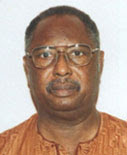

As insiders unravel graft involving NIA agent
Barely months or so after the end of the last Hajj (Muslim pilgrimage to Mecca), Jollof News have unmasked a ring of corruption among individuals charged with running the affairs of the annual journey to the Holly Land. The product of weeks of investigative work, this report gives account of a typical Gambian intelligent agent at work, re-enforcing an already hugely dented image of the country’s National Intelligence Agency (NIA). National intelligence institutions, depending on their individual policies, engage in clandestine and covert activities beyond espionage, like political subversion - for what this very body on the spotlight stands widely accused of - sabotage, assassination, among a host of other messy businesses. Ideally speaking, however, some would argue that intelligence bodies, be they national or private/business based interests, are expected to engage in collection and analysis of information, either covertly or otherwise, and such information put at the best interest of the general good. This, unfortunately, is not the case with the Gambian National Intelligence Agency – at least not with the evidently strong affinity for the controversy it is known for.
Arguably intended for a vehicle to safeguarding national interest, Gambia’s NIA has over the years transformed into a total misnomer, having been high jacked by the most odious of incompetent, criminal-minded, vindictive individuals espousing a bad trend of unquenchable taste for wealth and luxury. We have seen this in the ‘NIA Six Diamond theft’ saga, an infamously protracted court case on going at the Kanifing Magistrates Court. We have also seen it in a separate case involving two other agents facing charges of abuse of office. And the list goes on and on and on. There are probably more that haven’t yet come to public notice. And certainly there are those that will never, ever come out to see the light of day, at least not in this world.
But despite this undesirably grim record, it certainly would never have crossed the mind of many that Gambia’s fierce secret police would have extended its disdainful operation to as far as Saudi, or worst still, get involved in religious rites as sacred as the Hajj. Unfortunately, this is exactly what Jollof News Online has discovered. This report also highlights a quizzical reputation for the country’s Hajj Commission, a body not so distant from similar controversial domain, supposedly headed by ‘cultured’ and ‘respectable’ religious figures. One of our many sources in this report, all of them having spoken to us on condition of anonymity, described last year’s hajj as ‘‘the worst Hajj I have ever attended in 12 years.’’ Among the people implicated is Joof Sambou (Pictured), an NIA agent attached to the Gambian consulate in the Saudi city of Jeddah. Despite his sensitive position as a security agent, Sambou serves as a de factor representative for both the Gambian Hajj Commission and the Gambia International Airlines (GIA), operating some sort of a business enterprise, lobbying for lodges for Gambian pilgrims who fly on the ticket of GIA. Sambou has an accomplice in the person of Sa Colley, a Gambian-Spanish, who is based in Spain and brings pilgrims from there to Saudi Arabia. Colley, in connivance with Sambou, would introduce what is called VIP Hajj program in GIA, effectively serving as the airlines’ agent in that part of the world. A distasteful urge for profit making meant that housing prices are inflated with no commensurable reflection on the housing conditions pilgrims eventually find themselves in. One former pilgrim described ‘‘poor housing in Medina and Mecca,’’ and called the situation in Meena ‘‘worst,’’ despite the huge money they pay. It turned out that the introduction of the so-called VIP Hajj was a calculated move aimed at maximizing profit for the parties involved, which certainly include Joof Sambou and Sa Colley. Although some sources pointed to the involvement of the Amirul Hajj (head of the country’s Hajj Commission), we haven’t been able to substantiate this. Every Gambian pilgrim is required to pay about D5000 in addition the normal charge to qualify for a VIP status. This, accordingly, brings the overall package to well over D100, 000 per VIP pilgrim. But the bitter experience Gambian pilgrims go through in the hands of slipshod guides, coupled with the disappointing housing conditions created a strong force of disgruntlement among them. The dissatisfaction is even more pronounced among the Gambian community based in the Kingdom. Joof Sambou appears to be at the center of all this mess, accused of illegally earning thousands of Saudi Riyal by entering to contractual agreement with agents and inflating figures. ‘‘Every Gambian living in the Saudi city of Jeddah knows that Sambou earns his money from evil acts, at the expense of poor Gambian pilgrims,’’ one angry source said. This source pointed to the situation in neighbouring countries as contrasting evidence.
While last year’s package in Gambia was more than 4000 US dollars per pilgrim, those from our next door neighbour, Senegal, had to pay nothing more than 3700 US dollars. A comparison of the real cost of housing in Mecca and Medina, gauged against what individual Gambian pilgrims are charged, provided a solid backing for the sources’ claims. In Medina you can get houses for as cheap as 750 Saudi Riyal (about 200 US dollars) per month, while in Mecca the cost for that same period lies between 2000 and 3000 Saudi Riyal. But in line with the calculation by Agent Sambou and his accomplices, Gambian pilgrims pay as much as 1000 US dollars for a house per month. Apparently, Sambou, in connivance with the other parties, inflates cost and shares the excesses.
How Joof Sambou became so rich within a short space of time:
Sambou, in the name of GIA, made a deal for a housing contract in Medina and Mecca with the assistance of an ex-Nigerian student from Medina University. Between them they allegedly inflated the cost. Sources back their claim on Sambou’s unscrupulousness on his unrepentant spending style. They described him as flamboyant with a habit of endlessly buying very expensive cars. A BMW he presently owns, for instance, cost him D2.5 million dallasis. He claims it was a gift from a Saudi friend of his. Let’s imagine Sambou is right in that; what kind of favour could he possibly have done in exchange for such a hugely expensive gift? Why couldn’t Mustafa Bojang, Gambian Consular General in Riyadh, attract such gift from the many people he most probably has come across? a source sarcastically asked. Bojang, the source argued, knows Saudi Arabia far more extensively than Sambou whose taste for luxury contrasts widely with the rest there. Our investigations uncovered a rather impressive looking but stained record of Sambour’s flamboyance; a horde of vehicles he is said to have acquired since his coming to the Riyad mission.
1.Mitsubishi 4 Wheel, now in Gambia
2.Benze SE600, given out as gift to a Ghanaian friend of his
3.Toyota 4 Wheel, given to his Ivorian friend in Italy as a gift
4.GMC 1 and GMC 2, packed at the Gambian consulate in Jeddah, waiting to be shipped to Gambia.
Sambou also stands accused of aiding economic immigrants with residential documents, using his diplomatic status.. A point in case is his aiding of a none-Gambian marabou, allegedly a money doubler bent on defrauding people. Presently, one of Sambou’s sponsored agent, in the person of Wuyeh Colley, is reportedly been detained by the Saudi security authorities, awaiting trail.. Wuyeh, in 2006, allegedly earned over 600,000 Saudi Riyals (about 160,000) US Dollars) in some clandestine deal. Sources can only tell that he uses his fake status as an official to achieve this. He was said to have later been promoted as assistant consul general of the Gambia. But since his appointment as vice consular in Jeddah, many Gambians who spoke to us said, they have been enmeshed in endless problems from him. Wuye, like his patron, is well in the housing contract business for GIA. We learnt that a number of privately owned travel agencies have always been reluctant to work with Sambou. A particular former official at the GIA (name withheld) who later lost his job thanks to a presidential decision reportedly refused to work with Sambou during his time. Apparently it all boils down to that same old story of framing people who see life differently as anti-Jammeh, and get them off your way.
2009 Hajj Review
The sufferings experienced by Gambian pilgrims in the hands of greedy government representatives can be explained by the revealing and bitter experience of an old man who travelled all the way to the Holly Land but would not perform his Hajj, the purpose for which over D100, 000 had been spent on him. Ebrima Hydara from Sabi in the Upper River Region of the Gambia got lost along the way as the Hajj progressed. You wouldn’t blame him as old age is a defect that leaves very little control of an individual in their own hands. Old Hydara, when he got lost, surfaced on the side of the Senegalese group in Meena. A lady by the name Aja Fatou Joof, who just by coincidence happened to be married to a Gambian, took it upon herself and informed the Gambian Hajj authorities, precisely Sambou Joof, asking him to arrange for Hydara to be redirected. She had to make repeated calls informing the Gambian authorities that time was running out. However, despite all her effort, no guide turned up, leaving the old man stranded. He never completed his rite. Both Sambou and Amirul Hajj are said to be well aware of the case of Hydara. Up until now he has never been refunded, nor has he been issued any explanation so far. ‘‘I was totally shocked as to how our own brothers treat our pilgrims,’’ one of our sources narrated. And he went on, ‘‘the gift that the president, Yahya Jammeh gave as feeding to Hajjis (pilgrims) in Arafaat was under Joof Sambous’ control. This year’s hajj rams were also under his control.’’ Gambian women living in Jeddah and students attending schools in Medina and Mecca are said to be the least happy about Sambou’s alleged greediness. ‘‘I know that if the minister and president know about what prevails here, especially in the case of Joof Sambou, he will be transferred or recalled,’’ another source said.










